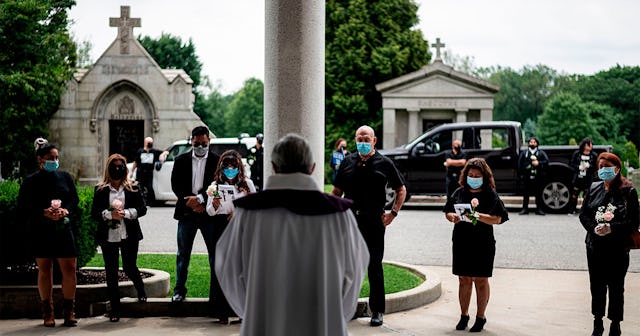It Shouldn't Take The Death Of Someone You Know To Get Serious About COVID-19

Back in March, I read this pretty profound quote in the Star Tribune from Melody Heide, a Minnesota community college English professor: “I was told by a biology professor in college years ago that there are two types of people out there. The first is those who say, ‘If there is a problem, let’s do something about it before there is a body count.’ The second is those who say, ‘If there is a problem, show me a body count and we will do something about it.’ But now, seven weeks and 61,000 deaths later, and with the pushback from many eager to get back to normal, I wonder if there is a third type: If there is a problem, show me the body of someone I love, and then I’ll believe that what we’re doing is the right thing to do.’”
At the time, I assumed 61,000 deaths from COVID-19 would be enough for people to take this virus seriously, and yet, here we are, in October, with over 200,000 Americans dead from COVID, and people are still fighting against basic safety guidelines like social distancing and mask wearing. They use the justification that they don’t believe the COVID death count, or that it’s all a liberal conspiracy, as reasons to still have a backyard party or to come storming into a Walmart without a mask. But now, looking back on Heide’s quote, it’s pretty difficult not to realize how prophetic it was. To be honest, I find that reality pretty depressing, and I think you should too.
Unfortunately, there are examples. Take a look at what happened recently at Appalachian State in North Carolina. According to CBS News, Chad Dorrill, a 19-year-old student at Appalachian State University who his mother and former coach described as a “super healthy” athlete, died in late September due to coronavirus complications. Dorrill’s death was on the heels of a university outbreak. 550 students had tested positive for the virus since in-person classes resumed earlier that month, and yet Appalachian State remained open for in-person instruction.
ANGELA WEISS/Getty
However, as sad as it is to say this, it took the death of an otherwise-healthy college freshman for the students of Appalachian State University to pause and realize that COVID-19 is no joke. According to a recent article in the New York Times, “Dorrill’s death has shaken the rural Appalachian State campus in the Blue Ridge Mountains, sparking questions about whether the college is doing enough to keep its students and faculty safe.” Emma Crider, a student at Appalachian State University said, “It’s not a hoax, that this virus really does exist. Before this, the overall mentality was ‘out of sight, out of mind.”
This is not uncommon, for people (and entire institutions, obviously) to not take COVID-19 seriously until someone they have a connection with dies.
I have family members who were pretty casual about COVID-19 safety precautions. My wife and I actually got into an argument with them about how COVID-19 was a serious issue, and that mask wearing and social distancing wasn’t about choice, it was about public health. Naturally, they gave me all the now-cliché arguments, telling me it wasn’t any worse than the flu, and they didn’t believe the COVID-19 death numbers.
But then, a friend from their church died. He was a father of three, in his late 30s, healthy and hardworking, and suddenly their tone changed. They posted a GoFundMe online, and discussed their grief, and mentioned COVID-19 needed to be taken seriously.
ANDREW CABALLERO-REYNOLDS/Getty
I couldn’t help but read their post and think about the arguments we’d had one month earlier. We shouldn’t have to get here, to the death of a loved one, before people take the virus seriously. And yet, time and time again, people refuse to sit down and think, really think, about how devastating 200,000 deaths from COVID is, and how it shouldn’t matter if you had a connection with one of the dead personally before you see it as a threat.
Friends, I’m going to say this as plainly as I can: people are dying from COVID-19. A lot of people. This isn’t a US-only problem, it is a worldwide pandemic that isn’t going to get better until we have a vaccine. But until we have one, we are going to have to take proper precautions. We are going to have to wear masks in public, and social distance. We have to take it seriously as a group, all of us, every single one of us. Whether we’ve been personally affected or not.
200,000 dead is not just a number. Those were real people, who had real lives, and just because you didn’t have a connection with them doesn’t mean that their deaths shouldn’t give you an overwhelming pause. All of this, every safety precaution, is an example of love and empathy for your fellow humans. So wear your mask, wash your hands, keep your distance, and take this virus as the real deal. Lives are depending on it.
This article was originally published on